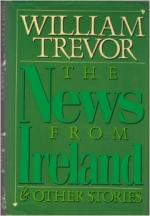|
This section contains 2,257 words (approx. 6 pages at 400 words per page) |

|
In this essay, Bonaccorso illustrates how Trevor employs his characters to evoke the author's view of historical truth.
What is history? Is it a kind of truth that transcends our individual lives, and, essentially, our understanding? Or is it our creation, an external manifestation of our lives together, of relationships that begin at the level of intimacy? Here, at this base point, we often find the wisdom of fiction.
A prevalent device for the revelation of truth in William Trevor's fiction is his characters' evasion or subversion of it. When these characters are seen in their social contexts, it is historical truth that often emerges like an uninvited guest, insinuating itself into collective experience and individual lives. Amorphous and mainly perceptible in shapes of family, class, and culture, history is ultimately revealed as a moral force adhering to the inheritances and destinies of Trevor's people.
In the...
|
This section contains 2,257 words (approx. 6 pages at 400 words per page) |

|




